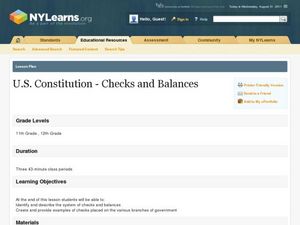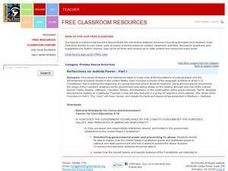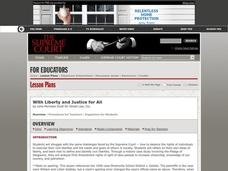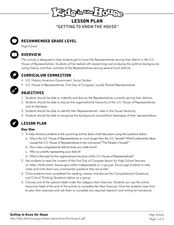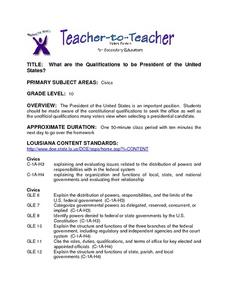Curated OER
U S Constitution--Checks and Balances
Students get an in-depth look at how our checks and balances system helps maintain the separating of powers between the three branches of government. They use current event head lines and insert them into he appropriate space on the...
Curated OER
The Role of the Judiciary in a System of Separation of Powers and Checks and Balances
Students determine the difference between the different branches of government and assess the role of each within the American governmental system.
Curated OER
We the People: An American Government Project
High schoolers identify key representatives in the legislative and executive branches of the Federal and State governments
Judicial Learning Center
Judicial Independence: What’s Wrong with This Court?
Why is it important for judges to operate independently of politics or other branches of government? Scholars ponder the question as they examine video clips, case studies, excerpts of the US Constitution, and an interactive computer...
Curated OER
Our System of Checks and Balances
Students study the governmental system of checks and balances between the individual branches. The balances are reviewed and the goal of the lesson plan is to develop and answer the question, "What are some ways the three branches of our...
Curated OER
Reflections on Judicial Power - Part I
Students research the Constitutional provision for the Judicial branch of government. They examine different U.S. founder's positions on the relative strength of the judicial branch and act as a review court for Marbury vs. Madison.
C-SPAN
Choice Board: Expressed and Implied Powers
Article 1, Section 8 of the United States Constitution expressly lists powers given to Congress. Over the years, lawmakers have expanded the enumerated powers to include powers implied by the list. To better understand the significance...
C-SPAN
How A Bill Becomes A Law
Seven steps are required for a bill to become a United States law. The Families First Coronavirus Response Act (H.R. 6201) is used as a model for the process of how a bill becomes a law. Class members work independently through a Google...
Curated OER
The U.S. Constitution Power Grab Game
Learners study the powers and limitations of the three branches of the American government. They explain how the system of "checks and balances" protects the individual citizens. They explain how the amendments to the Constitution...
Curated OER
Leaders in the Executive Branch
High schoolers read case studies about the leaders in the executive branch of government. After reading the study, they answer discussion questions and determine if the leader is a good fit for the job. They identify the...
Curated OER
Leaders in the Legislative Branch
Young scholars read case studies about the leaders in the legislative branch of government. After reading the studies, they discover how the leaders have compromised on issues to best serve their states. They answer discussion...
Curated OER
Lobbying
Students examine the role of lobbyists in Washington, D.C. For this Legislative Branch lesson, students watch video segments and read excerpts about lobbying. Students write essays that explore the pros and cons of lobbying.
Curated OER
With Liberty and Justice for All
Young scholars examine the role of Supreme Court justices. In this judicial branch lesson, students consider the civil rights and civil liberties as they investigate Minersville School District v. Gobitis (1940) and West Virginia State...
Curated OER
Successful Deaf Leaders in Government
Students research branches and agencies of state government to further explain how legislation and initiatives impact Deaf community. They conduct email interviews with Deaf government leaders, and create electronic portfolios.
Curated OER
How the Supreme Court Affects the Lives of Teens
Students describe the structure and function of the United States Supreme Court. They examine and analyze decisions made by the Court. They participate in a debate about recent issues.
Curated OER
Democracies in North America: Canada, the United States, and Mexico
Students examine democratic values. In this democracy lesson, students research the political systems of Canada, Mexico, and the United States in order to compare and contrast them. Students also discuss domestic and international events...
Curated OER
Getting to Know the House
Learners take a closer look at representative government. In this House of Representatives lesson, students discuss their local representative in Congress and research his or her responsibilities. Learners respond to the provided...
Curated OER
What are the Qualifications to be President of the United States?
High schoolers research the qualifications necessary to be the president of the United States. They create a want-ad for this position using what they have learned about the qualifications.
iCivics
Separation of Powers
In a fun and informative simulation, your learners will act in groups as lead chefs, menu writers, and nutrition inspectors in deciding a new school lunch menu. They will then compare and contrast their experience to the interaction...
Curated OER
It's Your Right: A Civil Rights Brochure
Learners examine the US Constitution, Bill of Rights, and Supreme Court cases in order to broaden their understanding of the US Judicial System. They research a variety of textual and Internet resources to create a tri-fold brochure,...
C-SPAN
Supreme Court Justices Research and Resumes
According to Article III, Section1 of the United States constitution, the only qualification one needs to be appointed to the Supreme Court is to demonstrate "good behavior." The president and Congress are given the power to determine...
National Endowment for the Humanities
Lesson 2 James Madison: The Second National Bank—Powers Not Specified in the Constitution
How much power is too much power for the federal government? Scholars use primary documents and constitutional research in groups to analyze the creation of the Second National Bank under James Madison. This is the second lesson of a...
Curated OER
Why Does Congress Work That Way?
Young scholars discover the powers of Congress. In this legislative branch lesson, students examine the legislative process as they analyze Article I of the U.S. Constitution. Young scholars consider the powers of Congress as they define...
Curated OER
Voting Simulation
Students explore the process of voting. They study the lawmaking branch of the state government.


